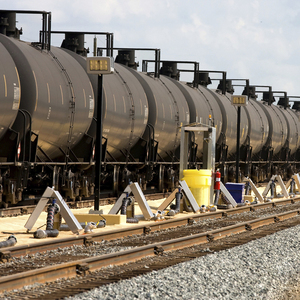NTSB to prioritize safe shipment of ethanol

March 13, 2019
BY Matt Thompson
The U.S. National Transportation Safety Board recently released it’s Most Wanted List for 2019 and 2020, with a focus on the ethanol industry.
According to the list, the safe shipment of hazardous materials—including ethanol and crude oil—can be achieved by upgrading current tank cars to the new DOT-117 cars. NTSB notes 16 percent of the U.S. tank car fleet that carries hazardous material has been upgraded so far.
Advertisement
Advertisement
Robert Hall, NTSB’s director of the Office of Railroad, Pipeline and Hazardous Materials, said the list is a way the board “highlight[s] transportation safety improvements that we would like to see, and just to bring some extra attention to those.”
Hall said the NTSB is monitoring the industry’s progress toward upgrading to the new cars. “We’ve had some experiences in the past—particularly positive train control being a recent one—where we got to the point that it was a federal requirement, but the industry did not meet the mandates of the regulation,” Hall said. “And so, at this point, we’re just really monitoring the industry’s progress toward meeting the requirements of the regulation, just to keep public attention on it.”
Advertisement
Advertisement
NTSB is not a regulatory agency, so Hall said the items on the list are recommendations, rather than mandates. However, the Federal Railroad Administration requires cars that are used for shipping ethanol be upgraded or retrofitted by 2023.
Hall said that, in the past year, the ethanol industry “has really started to make substantial progress towards meeting the mandate.” While NTSB had initial concerns with the industry’s progress, Hall said “we looked at it, and there’s progress being made, so that certainly is in line with what we’re looking for.”
In addition to the newer tank cars, Hall said the NTSB issued a recommendation to Hazardous Materials Safety Administration to research whether it’s safer to ship undenatured ethanol than denatured. The recommendation followed a 2017 derailment near Graettinger, Iowa. “It’s safer in the undenatured state,” Hall said. “You have environmental issues when you have a spill of denatured ethanol. The undenatured ethanol, from an environmental damage standpoint, is a much easier product to clean up. The cleanup is greatly simplified without the gasoline in it.”
Related Stories
U.S. fuel ethanol capacity fell slightly in April, while biodiesel and renewable diesel capacity held steady, according to data released by the U.S. EIA on June 30. Feedstock consumption was down when compared to the previous month.
XCF Global Inc. on July 8 provided a production update on its flagship New Rise Reno facility, underscoring that the plant has successfully produced SAF, renewable diesel, and renewable naphtha during its initial ramp-up.
The U.S. EPA on July 8 hosted virtual public hearing to gather input on the agency’s recently released proposed rule to set 2026 and 2027 RFS RVOs. Members of the biofuel industry were among those to offer testimony during the event.
The USDA’s Risk Management Agency is implementing multiple changes to the Camelina pilot insurance program for the 2026 and succeeding crop years. The changes will expand coverage options and provide greater flexibility for producers.
EcoCeres Inc. has signed a multi-year agreement to supply British Airways with sustainable aviation fuel (SAF). The fuel will be produced from 100% waste-based biomass feedstock, such as used cooking oil (UCO).
Upcoming Events










